Gandhis Win, Congress Loses
Sonia and Rahul Gandhi can have the satisfaction of a Pyrrhic victory. The party has formally reaffirmed their leadership, but it is seen as completely out of sync with the times
 Harish Khare
Harish Khare
 Harish Khare
|
28 Aug, 2020
Harish Khare
|
28 Aug, 2020
/wp-content/uploads/2020/08/Gandhiswin1.jpg)
(Illustration: Saurabh Singh)
The Indian National Congress, probably the world’s oldest political organisation, has been in the throes of an absurd civil war ever since Rahul Gandhi stepped down as its president after he led the Congress to a comprehensive defeat at the hands of Narendra Modi’s BJP in the 2019 Lok Sabha elections.
There is a certain Kafkaesque quality to this war among the Congressmen. It is a fight without real antagonists and without real enemies. Arrayed on one side are the Rahul Cabalists who want a quick end to the state of suspended animation, instigated in the first place by their own man walking away from the job; on the other side are some of the established organisational men, who also are insisting that the leadership issue must be sorted out and that the party cannot wait indefinitely for the vacillating Rahul Gandhi to make up his mind whether he wants to shoulder the responsibility of leading the organisation.
Both sides were acutely aware that the Rahul Gandhi-centric uncertainty was haemorrhaging the party. Jyotiraditya Scindia’s defection to the BJP was a rude shock to the Congress rank and file; after all, here was an important leader, touted as Rahul Gandhi’s most trusted right-hand man, crossing over to the enemy camp and bringing down the Congress government in Madhya Pradesh, that too in these days of acute political adversity; and then came the young Sachin Pilot’s rebellion in Rajasthan. The Congressmen were a deeply dispirited lot as most could directly trace the Bhopal disaster and the Jaipur revolt to the leadership conundrum at 24, Akbar Road, the All India Congress Committee headquarters. It was becoming too painfully obvious to one and all that this debilitating drift could not be allowed to go on indefinitely.
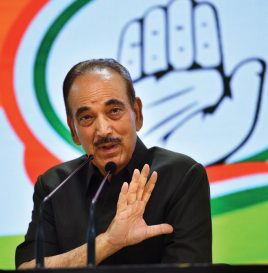
Yet, the simmering internal war remained a gentle affair. It finally boiled over when the Congress Working Committee (CWC) met (virtually) on August 24th. The Rahul Cabalists had planned a putsch: the idea was to hustle the highest decision-making body into demanding that Rahul Gandhi should take over, once again, as the party president. Not so fast, Sir, said the ‘dissenters’. We want to discuss the terms of his return.
Hence, the famous ‘leak’ to The Indian Express a day before the CWC was to meet. The country was surprised to learn that as many as 23 Congressmen had developed a spine to put their signatures to a communication to the interim president, Sonia Gandhi, questioning the way in which the party was functioning on her watch.
The seniormost ‘dissenters’, Ghulam Nabi Azad, can very well be accused of being responsible for the decline and decimation of the Congress in Uttar Pradesh
There is a certain delicious ridiculousness to this whole affair. Most Congressmen, from the seniormost member of the CWC to district Congress committee functionaries, subscribe to the gravamen of the so-called dissenters’ missive. Many claim to have similarly pointed out to Sonia Gandhi what was wrong—and what needed to be done to correct things—in the party. But they were shocked and unhappy, even as offended as was the Gandhi household—because the dissenters had in effect violated the code of silence. A kind of Omertà, so assiduously put in place over the years, stood defiled.
THE LETTER TO SONIA GANDHI FROM 23 CONGRESS LEADERS
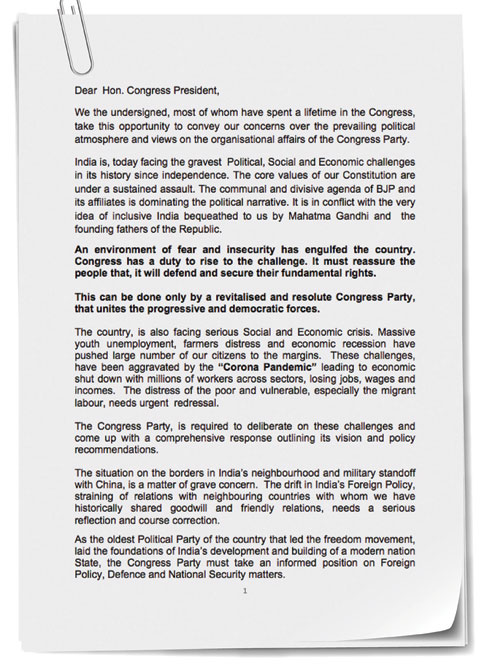
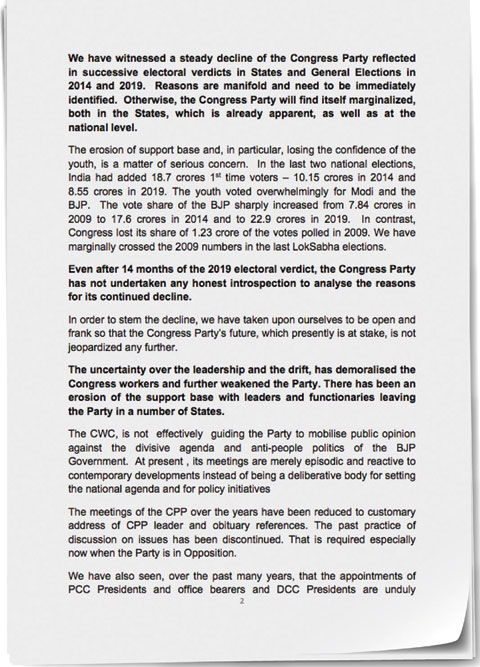
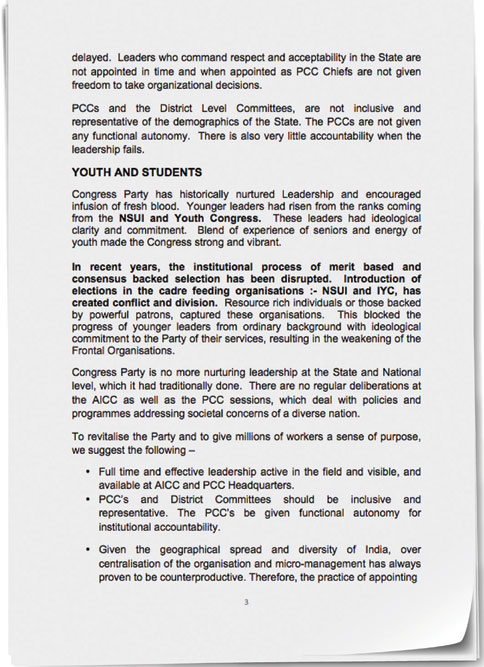
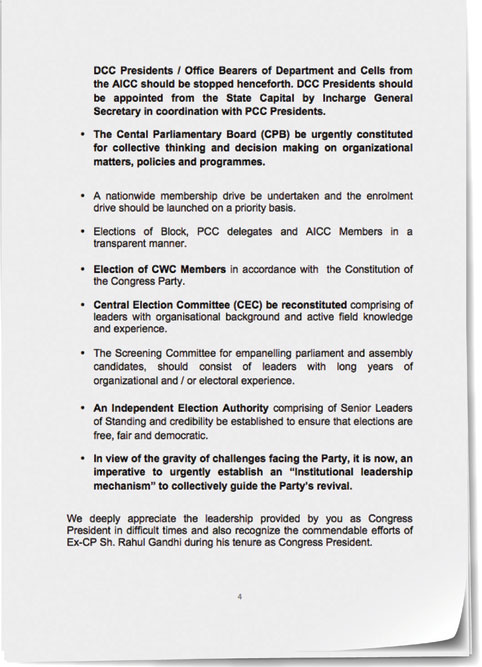
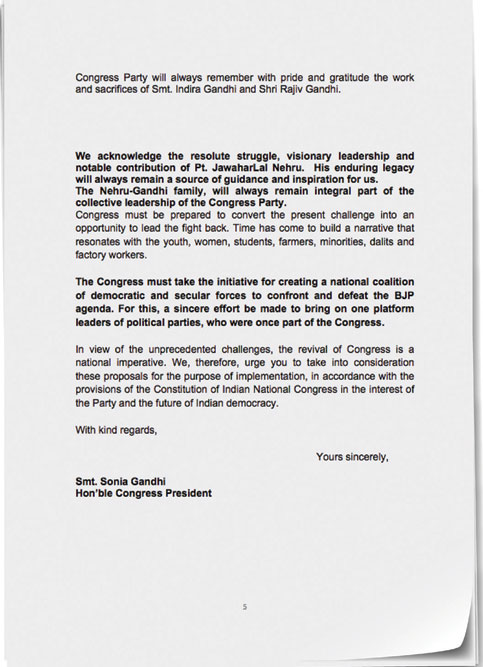
EXCEPT A handful of the Rahul Cabalists (who also include Priyanka Gandhi Vadra’s spear-carriers), all Congressmen are in agreement with the bottomline of the dissenters’ argument: the Congress party has to start functioning as a modern political organisation.
The dissenters argument is simple: come to terms with the Congress’ reduced status and diminished fortunes; undertake a course correction as the old ways of doing business are no longer working; the Congress will have to be more than a family outfit; and that the comfort and convenience of a coterie must give way to the possibilities of a wider consultation in a somewhat institutionalised manner. The call is for recognising the ‘imperative to urgently establish an ‘institutional leadership mechanism’ to collectively guide the Party’s revival.’
The dissenters’ make a point of underlining that they are not staging a ‘revolt’ against the Family. They acknowledge ‘the resolute struggle, visionary leadership and notable contribution of Pandit Jawaharlal Nehru. His enduring legacy will always remain a source of guidance and inspiration for us. The Nehru-Gandhi family will always remain integral part of the collective leadership of the Congress Party.’ They acknowledge the role and contribution of Indira Gandhi, Rajiv Gandhi, Sonia Gandhi, and even of Rahul Gandhi.
The simmering internal war had remained a gentle affair. It finally boiled over when the CWC met (virtually) on August 24th. The Rahul cabalists had planned a putsch: the idea was to hustle the highest decision-making body into demanding that Rahul Gandhi should take over, once again, as the party president. Not so fast, sir, said the ‘dissenters’. We want to discuss the terms of his return
Yet the call for ‘collective leadership’ is a red rag. Translated into simple language, the dissenters were telling the young Gandhis that you have forfeited your ‘natural’ claim to the family legacy. In other words, without being a Nehru or without the charisma of an Indira Gandhi, without their clout with the voters and the masses, without their acceptability and respectability, Rahul Gandhi cannot be given carte blanche to lord over the Congress.
THE dissenters’ argument was deeply disturbing because it disrupts the narrative of a natural entitlement for Rahul Gandhi. What the dissenters are saying is that his leadership is not all that natural—and that if you insist on pressing your leadership claims, it will need to be circumscribed. The long and short of the dissenter’s case: his cultivated whimsicality was no longer beyond contestation.
Before the August 23rd ‘leak’, the Congress chroniclers and watchers had indeed picked up the scent of the disquiet over Rahul Gandhi’s waywardness gathering an irreversible momentum. Once the letter was out (and it remains a mystery which side leaked it), the Gandhis had every reason to fear its ramifications: a number of individuals had blasphemously coalesced into a group. And the group could become a crowd that, in turn, could marshal a sense of purpose and excitement by tapping into the dormant reservations about the young Gandhis. A psychological barrier has been crossed.

The coming together of this band of 23 had the potential to strike at the heart of the control and command mechanism that has been put in place since March 1998: no group or collective voice will be raised or recognised; individual personal concerns, needs, and grievances can be communicated and each petitioning Congressman must await patiently for a response from the high command. Individual frustrations, furies and fulminations, if any, must remain a quiet affair between the leader and the led.
The dissenters also sought to question an enduring and convenient myth: every Congressman exists, survives and prospers because of the indulgence, generosity and patronage of the Family. Over the years, very many leaders—from Tarun Gagoi to Bhupinder Singh Hooda to Digvijaya Singh to Kamal Nath—have been ‘allowed’ to groom their children for leadership roles. The dissenters themselves can be deemed to have been beneficiaries of this arrangement. Indeed, the first reaction of the party leaders was to incredulously ask “Is parivar ne inko kaya nahi diya (why all this, after this family has so abundantly pampered them)”.
Professional tale-carriers like Ambika Soni were always lent an ear at 10, Janpath. The only outcome was a distinct absence of solidarity among colleagues
The efficacy of the Family’s control is located in the internalisation of this myth of an omnipotent high command by each and every Congressman: each Congressman has privately lamented this helplessness but has publicly rationalised it as essential to the demands of discipline and hierarchy in the party. They have all settled for a kind of domestic violence syndrome: abuse, insults, ridicule and rejection must be gulped down silently, kept within the family’s four walls. Rarely does a Himanta Biswa Sarma muster the courage to walk out on the Family and its protection.
The Gandhis’ current strength lies in their success in fostering a culture of suspicion and disunity among Congressmen at every level. Each has been encouraged to think of fellow Congressmen as potential rivals for the Family’s attention and affection. Professional tale-carriers like Ambika Soni were always lent an ear at 10, Janpath. The only outcome was a distinct absence of a sense of solidarity among colleagues and comrades. It was the absence of this esprit de corps that prevented the UPA II Government from dealing cogently with challenges posed by its political and corporate adversaries, beginning with the Anna Hazare agitation. And it was this operative infirmity that hobbled the Congress response to Narendra Modi’s assault in 2014 and 2019.
The dissenters’ note—a collective voice—threatens and questions this carefully cultivated control mechanism. The dissenters themselves had to overcome a dilemma: none of the signatories can claim to have any ‘moral authority’ because they themselves have been part and parcel of this control mechanism. For example, the seniormost ‘dissenter’, Ghulam Nabi Azad, can very well be accused of being responsible for the decline and decimation of the Congress in Uttar Pradesh. Anand Sharma, another dissenter, has all along been a vigorous and vocal defender of the Gandhis and their magical touch.
Another abiding—and also the most useful mechanism of control—myth is the notion that only the Gandhis can hold the Congress together; that only the Gandhis have an all-India name recognition; that only they have an acceptability that cuts across ethnic and religious divides; that the Gandhis can be the only custodian of the Nehruvian legacy. This myth has ensured that no other leader is allowed to fancy himself as a mass leader; even those who happen to mobilise a certain following at the state level—say, a Digvijaya Singh in Madhya Pradesh or an Ashok Gehlot in Rajasthan or a Siddaramaiah in Karnataka—are never allowed to grow wings. The best that a Congress leader from outside the Family can aspire to is the role of a subedar, one who must know that he owes his existence and prosperity to the Delhi darbar.
In the officially approved Congress catechism, only the Gandhis can have an all-India face; hence the agonising question: Who is there to replace the Gandhis, even when the bankruptcy of the Family’s leadership stares everyone in the face—and despite the young prince’s all too evident waywardness? It was this exasperation with Rahul Gandhi’s erratic and eccentric leadership that finally drove the ‘dissenters’ to demand a change.
Before the August 24th CWC meeting, the Family played its cards cleverly and carefully: any questioning of Rahul Gandhi’s style of functioning was depicted as an attack on his mother, who remains a figure of respect and esteem. That was not all. The over-clever among the Rahul Cabalists used the anonymity of social media to spread the fake news that Sonia Gandhi had offered to resign immediately from her position as interim president. This compelled Manmohan Singh to lead the chorus to demand that she should continue as the Congress president. At the same time, the smart alecks among the Rahul Cabalists sought to dub the dissenters as acting at the BJP’s behest; for a few hours, it did look like the party was on the verge of tearing itself apart before sober impulses intervened to calm tempers down.
EVEN THOUGH the dissenters were able to stall, for now, the Rahul Cabalists’ unholy push for a constitutional putsch, the Gandhis, at the end of the day, can have the satisfaction of having scored a kind of Pyrrhic victory. The CWC has formally reaffirmed the leadership of the two Gandhis, Sonia and Rahul; but the party was seen as terribly out of sync with modern times, reduced as it was to beseeching “a sick old lady”—as a retired bureaucrat put it—to lead it to some kind of political and organisational vitality; Sonia Gandhi did herself no favours by coming across as a mother, partisan to her son, rather than as a wise leader who would help the party deal realistically with the existential threats it faces; and, worst of all, the Family faction failed to get any commitment from Rahul Gandhi that he would mend his recalcitrant ways.
That remains the rub. Rahul Gandhi’s truculence remains the most vexatious, most exasperating, most frustrating cause for the unease among Congress apparatchiks. And though the Rahul Cabalists seem to be in an unseemly hurry to organise a coronation for their man as full-time Congress president, the young prince himself remains unwilling to take up his royal duties and obligations.
Most Congress leaders remain mystified and baffled that the young man does not want to resume his role as party president; instead, he has unilaterally elevated himself—at least in his own mind—to the status of the party’s patron-saint. He wants to prescribe for himself the role that, say, a Bal Thackeray had in the Shiv Sena, a Mohan Bhagwat plays for the BJP, or even a Mahatma Gandhi did in the pre-1947 Congress. This aspiration is dismissed by even the closest Family loyalists as unacceptable and unworkable ‘backseat driving’.
Even as a leadership paralysis continues to grip the Congress, many inside and outside the party feel animated and excited at the Rahul Cabalists’ assertion that he remains the only man frontally taking on Prime Minister Narendra Modi. Curiously enough, BJP strategists, too, share Sonia Gandhi’s devout wish that her son should take over the Congress reins.
What a convergence! Prompting the sensitive soul to recall TS Eliot in ‘Ash Wednesday’:
Why should I mourn
The vanished power of the usual reign?

/wp-content/uploads/2024/12/Cover_Double-Issue-Spl.jpg)












More Columns
The Music of Our Lives Kaveree Bamzai
Love and Longing Nandini Nair
An assault in Parliament Rajeev Deshpande